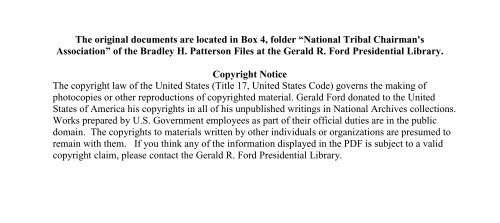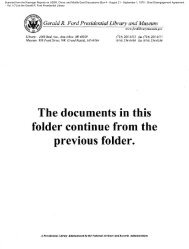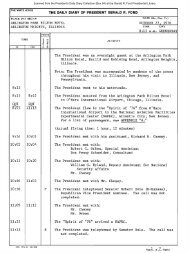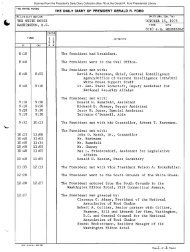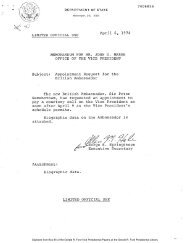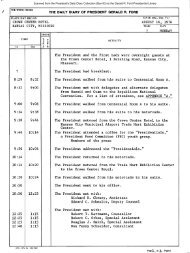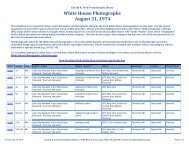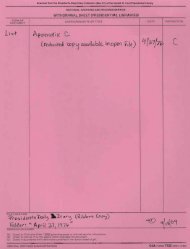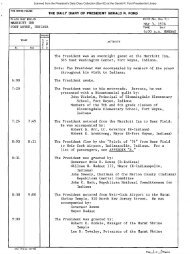National Tribal Chairman's Association - Gerald R. Ford Presidential ...
National Tribal Chairman's Association - Gerald R. Ford Presidential ...
National Tribal Chairman's Association - Gerald R. Ford Presidential ...
Create successful ePaper yourself
Turn your PDF publications into a flip-book with our unique Google optimized e-Paper software.
The original documents are located in Box 4, folder “<strong>National</strong> <strong>Tribal</strong> <strong>Chairman's</strong><br />
<strong>Association</strong>” of the Bradley H. Patterson Files at the <strong>Gerald</strong> R. <strong>Ford</strong> <strong>Presidential</strong> Library.<br />
Copyright Notice<br />
The copyright law of the United States (Title 17, United States Code) governs the making of<br />
photocopies or other reproductions of copyrighted material. <strong>Gerald</strong> <strong>Ford</strong> donated to the United<br />
States of America his copyrights in all of his unpublished writings in <strong>National</strong> Archives collections.<br />
Works prepared by U.S. Government employees as part of their official duties are in the public<br />
domain. The copyrights to materials written by other individuals or organizations are presumed to<br />
remain with them. If you think any of the information displayed in the PDF is subject to a valid<br />
copyright claim, please contact the <strong>Gerald</strong> R. <strong>Ford</strong> <strong>Presidential</strong> Library.
MEMORANDUM TO: TED<br />
FROM:<br />
THE WHITE HOUSE<br />
WASHINGTON<br />
June 24, 1975<br />
Please attach your own personal r<br />
request and then forward it directl<br />
further action by him.<br />
Thanks.<br />
endation to Ben Reifel 1 s<br />
Warren Rustand for
Dr. Ben Reifel<br />
Chairman of the Board<br />
American Indian <strong>National</strong> Bank<br />
1701 Pennsylvania Avenue, N.W.<br />
Washington, DC 20006<br />
Dear Dr. Reifel:<br />
NATIONAL TRIBAL CHAIRMEN'S<br />
ASSOCIATION<br />
Suite 406 1701 Pennsylvania Avenue, N.W. Washington, D. C. 20006<br />
202- 343-9484<br />
May 28, 1975<br />
The purpose of this letter is to finalize and to confirm the<br />
discussion in my office in April, 1975. It is also to request your<br />
assistance in establishing a meeting between the President of United<br />
States and <strong>National</strong> <strong>Tribal</strong> Chairmen's <strong>Association</strong> as early as such<br />
a meeting can be arranged. This request covers three (3) basic areas<br />
of immediate concern which are:<br />
Meeting between the President of the United States and the <strong>National</strong><br />
<strong>Tribal</strong> Chairmen's <strong>Association</strong>, i.e., Officers, Board of<br />
Directors and selected Committee members.<br />
A discussion on the the American Indian Policy Review Commission<br />
recently established by Congress.<br />
A discussion which considers an issuance of an Executive Order<br />
upon the subject of the Indian way of life, particularly the<br />
cultural traditional aspects of the American Indians.<br />
The following will reflect some background and more detailed<br />
information about the request for a meeting with the President and<br />
the tenor of some of the discussions which we desire.<br />
Background on the <strong>National</strong> <strong>Tribal</strong> Chairmen's <strong>Association</strong> (NTCA):<br />
The NTCA was formed in 1971 to provide a unified voice for the<br />
federally-recognized Indians of United States through duly elected<br />
Indian leaders.
Requirement for the membership in the NTCA is very simple, the members<br />
are duly and Democratically elected leaders of Indian tribes<br />
and Indian reservations. It may be mentioned here that it is recognized<br />
that there are many other Indian organizations in this<br />
country, but it should also be recognized that the NTCA is the only<br />
Indian organization which represents the Indian population, tribes<br />
and reservations for which the government has a special responsibility.<br />
These are the Indians and Tribes for whom the government has a trust<br />
responsibility dating back to the Constitution of the United States.<br />
The NTCA and the government share this responsibility, because they<br />
are the elected leaders and spokesmen for these particular tribes<br />
of Indians whom are federally-recognized. No other Indian organization<br />
is organized in this way and cannot claim to share the responsibility<br />
with the United States government nor can any other<br />
Indian organization claim to be the bona-fide federally-recognized<br />
Indians.<br />
The NTCA represents over 190 tribes, who represent over<br />
90% of the Federally-Recognized Land Based Indian Tribes;<br />
The NTCA recognizes that the available statistics on the many<br />
needs of the Indian people are not reflective of all Indians in the<br />
United States. This is because available statistics on low education,<br />
poor health, high unemployment and poor housing are all indicators of<br />
the needs of the federally-recognized Indians. There are no comparable<br />
data for the total Indian population of this country, and<br />
there should be a continuing effort through the government to meet<br />
the needs of the federally-recognized Indians.<br />
The purposes of the NTCA are many and they are complex. The<br />
Constitution and By-laws of the <strong>Association</strong> is attached for your<br />
future information. You will find that the NTCA is organized to<br />
perpetuate the culture and tradition of the Indian people as it relates<br />
to Indian lands, history and environment. You will also note<br />
from Article Three that the purposes are more clearly defined, including<br />
being a spokesmen for all Indian tribes under the aegis of<br />
elected Indian leaders. You will note from this Constitution that<br />
the NTCA is similar in its make-up to the <strong>National</strong> Council of Mayors<br />
and the <strong>National</strong> Council of State Governors. The Indian leaders of<br />
the NTCA serve at the pleasure of its constituency which elected<br />
them in the first place and which is the grass roots of the federallyrecognzied<br />
Indian situations in the country. The NTCA acts primarily<br />
as a consultant to the Unites States Government and the discharge<br />
of its responsibilities to the federally-recognized Indians. This<br />
is a radical departure from the previous practice of engaging consultants<br />
from all sectors of the American community without the<br />
participation of the Indian leaders who are elected by Indians<br />
themselves.<br />
2
'· f f . . ...<br />
In v1ew o the orego1ng and recogn1z1ng the trust responslb1l1t1es<br />
it is the desire of the NTCA to meet with the President and to build upon<br />
the responsibility which is shared by the Government and NTCA. It is<br />
hoped that a meeting with the President of the United States will begin<br />
a close working relationship between all agencies of the government with<br />
this unique <strong>National</strong> Council of elected Indian leaders.<br />
Background On American 'Indian Policy Review Commission:<br />
The American Indian Policy·Review Commission was established<br />
by the 93rd Congress to review the responsibility of United States<br />
of America to Indians. This includes a review of the trust relationship,<br />
the Bureau of Indian Affairs, the federally-recognized and nonrecognized<br />
Indians of the country much in the fashion of the Merian<br />
Commission of the 1920's. The purposes and the role of the American<br />
Indian Review Commission makes this an important issue to Indians.<br />
The Senate appointed Senators Abourezk, Hatfield and Metcalf while<br />
the House of Representatives appointed Congressmen Meeds, Yates and<br />
Steiger. These six (6) members, three (3) Senators and three (3) Congressmen<br />
then appointed one Indian who was non-federally recognized,<br />
one Indian to represent Urban Indians and three (3) Indians from the<br />
federally recognized Indian community. Adolph Dial (Lumbee, North<br />
Carolina) was appointed as a non-federally recognized Indian member.<br />
Louis R. Bruce (Mohawk-Sioux, New York City) was appointed as an Urban<br />
Indian member. The appointment from the federally-recognized Indian<br />
community included: Ada Deer (Menominee, Wisconsin), Jake White<br />
Crow (Quapaw, Oklahoma) and John Borbridge (Tlingit, Alaska). The<br />
NTCA objected to the appointment of the three (3) individuals representing<br />
the federally-recognized Indians. This objection was<br />
manifest in resolutions directed to the American Indian Policy Review<br />
Commission and a copy is attached for your information.<br />
The NTCA has petitioned the Commission to cease further activities<br />
until the elected Indian leaders who represent the aspiration of the<br />
federally-recognized Indians are involved. The NTCA wishes to discuss<br />
this issue with the White House in the hope that the White House and<br />
the Secretary of the Interior intercede to protect the interest of the<br />
federally-recognized Indians if the Commission persists in carrying<br />
out the provisions of the Bill which established the American Indian<br />
Policy Review Commission. It is hoped that this might be mentioned<br />
during the requested meeting with the President although we will not<br />
expect the President himself to address himself to these details<br />
during the meeting .<br />
3
Ad·Hoc Committees - Reports<br />
-2-<br />
Plans for Meeting with The Honorable Thomas S. Kleppe, Secretary of the Interior<br />
*Calls and letters of invitation have gone to Federal officials, other-individuals<br />
and organizations knowledgeable on these topics, asking their participation in<br />
these discussions.<br />
,.
I( M<br />
THE WHITE HOUSE<br />
WASHINGTON<br />
\ ...<br />
•
6.<br />
The survival of Indian society depends on its ability to project itself into<br />
the future. This projection will occur through Indian youth. The future<br />
protection of trust natural resouces and Indian society depends upon the<br />
development of Indian youth as <strong>Tribal</strong> leaders and their response to future<br />
challenges.<br />
<strong>National</strong> <strong>Tribal</strong> Chairmen's <strong>Association</strong> advocates training for Indian youth<br />
not only in areas of policy making but also in the technical and professional<br />
fields, encouraged to take training in natural resources {by means<br />
of a Policy Paper). •<br />
Supported by: Workshop/Panel VI, Items 3 and 4<br />
NOTE: Each of the above priorities was selected as the number one priority from<br />
each of the six Panel/Workshop groups. The remaining five priorities, 7-11,<br />
are suggested for inclusion within a proposed total of 11 priorities for<br />
primary action during the coming year. Should circumstances develop, Executive<br />
Director is free to act on other recommendations not identified among these 11<br />
priorities.<br />
7.<br />
Support I.H.S. and Indian Housing legislation and programs essential to federally<br />
recognized tribes.<br />
Supported by: Workshop/Panel IV, Item 5<br />
8.<br />
Strengthen tribal govenments through program support to maintain inherent sovereignty<br />
of tribes and on their own terms build the capacity to man and manage<br />
programs and to monitor the delivery of service.<br />
Supported by: Workshop/Panel II, Items 4 and 5<br />
Workshop/Panel IV, Item 3<br />
Workshop/Panel VI, Items 2 { see first and last paragraph of 2,<br />
Recommended Action), 5, and 6<br />
9.<br />
Development of mechanism by which <strong>National</strong> <strong>Tribal</strong> Chairmen's <strong>Association</strong> would<br />
have imput into the federal budgetary and appropriations process as required by<br />
Act of June 18, 1934, 48 Stat. 984, as amended.<br />
Supported by: Workshop/Panel I, Item 2 ,<br />
Workshop/Panel III, Item 2<br />
Workshop/Panel I, Item B<br />
Workshop/Panel IV, Items 4<br />
Workshop/Panel VI, Item 1 (see second paragraph of 1, Recommended<br />
Action)
10.<br />
Development of programs where possible to acquaint state and local subdivisions<br />
and citizens generally of nature and scope of tribal sovereignty and proprietary<br />
interest in trust property.<br />
Supported by : Workshop/Panel I, Item 3<br />
Workshop/Panel II, Items 3 and 7<br />
Workshop/Panel V, Item 40 (1)<br />
11.<br />
<strong>National</strong> <strong>Tribal</strong> Chairmen's <strong>Association</strong> as the focal point and advocate for<br />
Indian tribes in all federal programs, decisions, and actions affecting<br />
federally recognized tribes.<br />
Supported by: Workshop/Panel II, Item 8<br />
Workshop/Panel IV, Items 2A and 2B<br />
Workshop/Panel VI, Item 2 (see second paragraph of 2, Recommended<br />
Action)
NATIONAL TRIBAL CHAIRMEN'S<br />
ASSOCIATION<br />
Suite 207 1701 Pennsylvania Avenue, N.W. Washington, D.C. 20006<br />
PANEL/WORKSHOP V<br />
TRUST RESPONSIBILITIES<br />
1. TRIBAL SOVEREIGNTY<br />
202 - 343-9484<br />
A. The Federal government's trust responsibility includes the protection of<br />
tribal sovereignty from encroachment by other units of the government,<br />
including the federal government.<br />
B. ACCOMPLISHMENTS: None<br />
C. EVALUATION:<br />
(1) While there has been some improvement in this area, the Justice<br />
Department remains extremely reluctant to recognize its trust<br />
responsibility to assist tribes in defending their sovereignty<br />
when the issue becomes the subject of litigation.<br />
(2) Despite numerous recommendations by NTCA-member <strong>Tribal</strong> Chairmen<br />
that the 1968 Indian Civil Rights Act should be amended, nothing<br />
has been done.<br />
(3) The Interior Department Solicitor refuses to release a draft<br />
opinion that states, in effect, that there are no legal barriers<br />
to the exercise by the tribal governments of jurisdiction over<br />
non-Indians located within the boundaries of the reservation.<br />
(4) The 1968 Indian Civil Rights Act mandated that the Department of<br />
the Interior cause to be published a model criminal code, a digest<br />
of Solicitor's Opinions and an up-date of Cohen's Handbook of<br />
Federal Indian Law, these documents are several years overdue.<br />
The Department of the Interior should act with all deliberate speed<br />
to complete this work.<br />
(5) The Federal government in its protection of tribal sovereignty<br />
must of necessity enhance and strengthen tribal sovereignty in<br />
order that they can cope with constant attempts to undermine<br />
that sovereignty .
B. ACCOMPLISHMENTS:<br />
C. EVALUATION:<br />
D. FURTHER ACTION:<br />
(1) BIA Commissioner has recommended to the Interior Secretary that<br />
the Bureau of Reclamation file with the BIA for review and comment<br />
any proposed irrigation project plans in order to determine whether<br />
the proposed project might adversely affect Winters rights.<br />
(1) The Commissioner's retomrnendation is the first step forward to<br />
realizing this objective; however, the Secretary has yet to respond.<br />
(1) The Executive Board of NTCA will draft guidelines which must be<br />
considered at a minimum in an Indian rights impact with guidelines<br />
for implementation.<br />
(2) The President of NTCA will present to the President of the United<br />
States the guidelines for adoption by his Administration as a matter<br />
of policy.<br />
(3) The President of NTCA will seek adoption of the recommendation by<br />
the two national political parties as a part of their platforms.<br />
(4) The President of NTCA will advise the Commissioner to continue<br />
his efforts to'have the Secretary adopt the Commissioner's recommendation.<br />
(5) The President and Executive Board of NTCA will cause the Secretary<br />
of the Interior to develop a policy that will insure that the<br />
interest of the Indian Tribes in ceded areas are recognized and<br />
protected by federal agencies having administrative jurisdiction<br />
over these areas; e.g. religious shrines and historical sites.<br />
4. TRIBAL MANAGEMENT OF TRUST RESOURCES<br />
A. Protection against exploitation of trust resources by implementing the policy<br />
that tribal governments will have the major role in the management and development<br />
of their trust resources.<br />
B. ACCOMPLISHMENTS: None<br />
C. EVALUATION:<br />
(1) There still remains substantial reluctance on the part of some BIA<br />
officials to appreciate the ability of the tribes to manage their<br />
trust resources efficiently and prudently, with Northern Cheyenne<br />
and Crow as examples.<br />
-4-
D. FURTHER ACTIONS:<br />
(1) The President and Executive Board of NTCA cause the Secretary of<br />
the Interior to adopt a policy that the United States should firmly<br />
recognize ,that all Indian rights to natural resources, including<br />
rights to lands, water, timber, minerals and to hunt and fish, are<br />
held by the United States in trust for the Indian tribes or individual<br />
Indian owners. The full equitable ownership of these rights is in<br />
the Indian tribes or iMdividuals. This recognition should emphasize<br />
that Indian rights to natural resources are completely separate<br />
from other federally owned lands and rights, such as public lands,<br />
national parks, monuments and wildlife refuges, and military reservations,<br />
as well as historical sites and national forests.<br />
(2) The President and Executive Board of NTCA urge the Secretary of<br />
Interior to formally adopt the policy enunciated in the coal-leasing<br />
policy statement as the policy for all tribal resource development.<br />
(3) The President and Executive Board urge immediate hearings on and<br />
enactment of Senate Bill 2652 which provides that information concerning<br />
trust resources of an Indian Tribe be exempt from disclosure<br />
under the Freedom of Information Act.<br />
5. REASSERTION OF FEDERAL COURT JURISDICTION<br />
A. Protection by the reassertion of federal court jurisdiction in regard to tribal<br />
trust resources.<br />
B. ACCOMPLISHMENTS:<br />
C. EVALUATION:<br />
(1) The Justice Department argued in furtherance of federal court jurisdiction<br />
before the Supreme Court in the Akin case.<br />
(1) Positive reaction as stated above.<br />
D. FURTHER ACTIONS:<br />
(1) If the Supreme Court rules adversely to the tribes' interests,<br />
member tribes should seek an amendment to the McCarran Act which<br />
would exempt Winters rights.<br />
(2) NTCA will present, if necessary, an amendment to the McCarran Act<br />
to the two political parties for adoption in their platforms.<br />
-5-
Dear Bill:<br />
OCtober 27, 1976<br />
Thank you for your letter pf OCtober 18 conveyinq<br />
to us Resolution 10/76-l of the <strong>National</strong> <strong>Tribal</strong><br />
<strong>Chairman's</strong> Aaaociation concerning LaFollette<br />
Butler.<br />
I am bringing this pramp•ly to the attention of<br />
Secretary Xleppe wbo will make the appointment<br />
and. &lao to tbe Honorable Doug Bennett here at<br />
tbe White House who is tbe Director of the<br />
Preaidential Personnel Office.<br />
Sincerely,<br />
Mr. William Youpee<br />
EXecutive Director<br />
<strong>National</strong> <strong>Tribal</strong> Cbaixmen's<br />
Aaaociaticm<br />
Suite 207<br />
1701 Penn.aylvania Avenue, NW.<br />
washinyton, D.c. 20006<br />
cc: Secretary Keeppe,<br />
cc: Doug Bennett<br />
Bradley H. Patterson, Jr.<br />
.... \<br />
... ·j
NATIONAL TRIBAL CHAIRMEN'S<br />
ASSOCIATION<br />
Suite 207 1701 Pennsylvania Avenue, N.W. Washington, D.C. 20006<br />
202 - 343-9484<br />
RESOLUTION No. NTCA 10/76 - 1<br />
WHEREAS, the Office of Commissioner of Indian Affairs will within the near future<br />
become vacant due to the resignation of the present Commissioner, the Honorable<br />
Morris Thompson, and<br />
WHEREAS, the <strong>National</strong> <strong>Tribal</strong> Chairmen's <strong>Association</strong> has adopted a considered<br />
approach to the selection of a person to act in the Office of Commissioner of<br />
Indian Affairs, and<br />
WHEREAS, in the exercise of that considered approach, there has evolved the identification<br />
of certain criteria which the <strong>Association</strong> believes a person occupying<br />
this high office should meet, and<br />
WHEREAS, these criteria include the following:<br />
- knowledge of the Federal Government system;<br />
- demonstrated management ability;<br />
- knowledge of tribal government from a legal and an historical prespective;<br />
- demonstrated commitment to the principle of tribal self-determination<br />
and to the maintenance of the Federal Government's unique and continuing<br />
relationship with and responsibility to the Indian people;<br />
- knowledge of tribal government from a practical standpoint;<br />
- awareness of tribal governments as distinct from Indian organizations;<br />
- demonstrated ability to work with Indian organizations and tribal governments<br />
within their proper spheres;<br />
- demonstrated accomplishment of long-term gains of nationwide significance<br />
for tribal government and trust resources; and<br />
WHEREAS, the <strong>National</strong> <strong>Tribal</strong> Chairmen's <strong>Association</strong> has for a considerable time<br />
believed that the selection of persons to occupy positions of responsbility in<br />
the Agencies of the Federal Government should involve the direction of Indian<br />
tribes, and
WHEREAS, we now have in the Indian Self-Determination and Education Assistance<br />
Act, endorsed by this Administration, the philosophy and commitment to Indian<br />
tribal self-determination, which involves Indian tribal direction in Federal<br />
governmental decisions affecting Indian tribes, and<br />
WHEREAS, in his August 26, 1976, memorandum announcing the appointment of<br />
Bradley H. Patterson, Jr., as his Special Assistant, President <strong>Ford</strong> requested<br />
the heads of Federal Agencies to jnsure that when Federal actions are planned<br />
which affect Indian communities, the responsible Indian leaders are consulted<br />
in the planning process, and<br />
WHEREAS, in the selection of the individual to occupy the Office of Commissioner<br />
of Indian Affairs, the <strong>National</strong> <strong>Tribal</strong> Chairmen's <strong>Association</strong> does by this<br />
resolution exercise its right and duty to recommend to the Secretary of the<br />
Department of the Interior and to the President of the United States a specific<br />
individual whom the Board of Directors of the <strong>Association</strong> has determined best<br />
meets the essential criteria for that Office,<br />
THEREFORE BE IT RESOLVED, that with great honor the <strong>National</strong> <strong>Tribal</strong> Chairmen's<br />
<strong>Association</strong> recommends that LaFollette Robert Bulter be named Acting Commissioner<br />
of Indian Affairs.<br />
CERTIFICATION<br />
It is hereby certified by the undersigned that the foregoing Resolution was<br />
adopted by the Board of Directors of the <strong>National</strong> <strong>Tribal</strong> Chairmen's <strong>Association</strong><br />
in a duly constituted meeting on the 14th day of October, 1976, at which meeting<br />
there was a quorum present and a majority e Board member ting.<br />
ATTEST:
Ad Hoc Committees - Reports<br />
-z-<br />
Plans for Meeting with The Honorable Thomas S. Kleppe, Secretary of the Interior<br />
* Calls and letters of invitation have gone to Federal officials, other individuals<br />
and organizations knowledgeable on these topics, asking their participation in<br />
these discussions.<br />
,.,.


